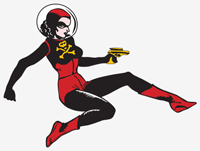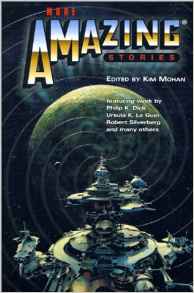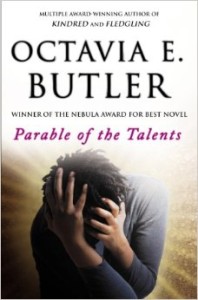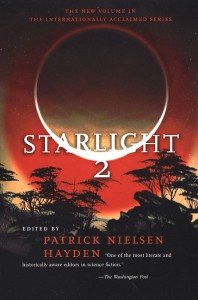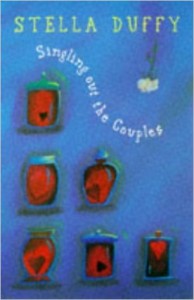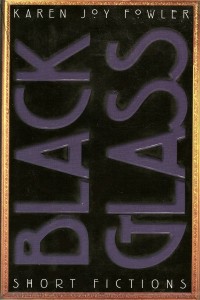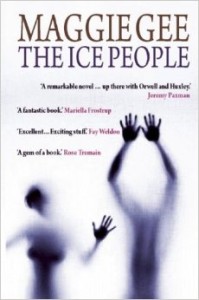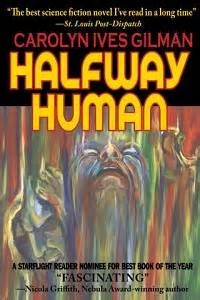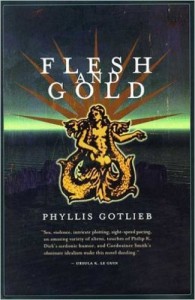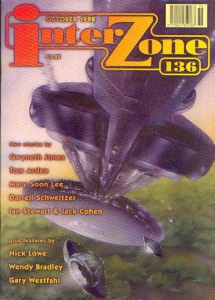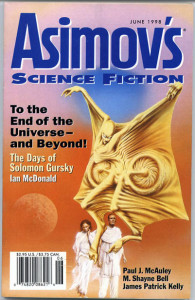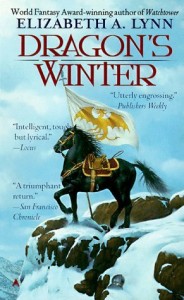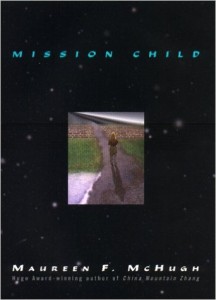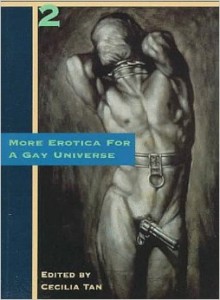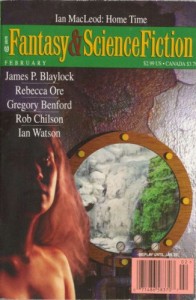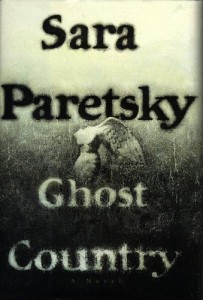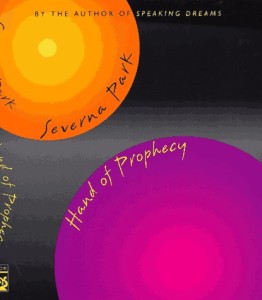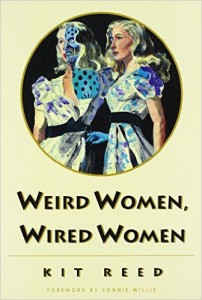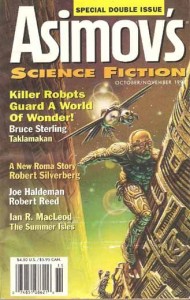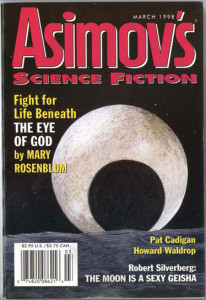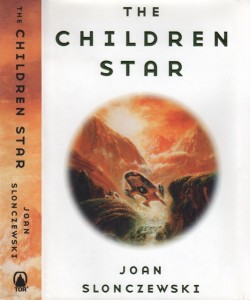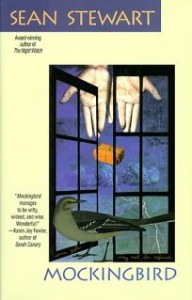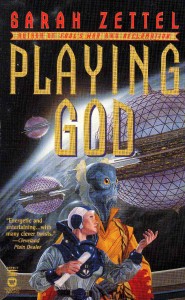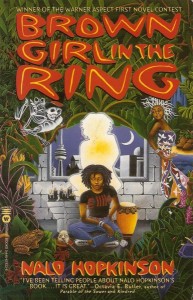In addition to selecting the winner, each jury chooses an Honor List (previously called a “Short List”). The Honor List is a strong part of the award’s identity and is used by many professors as a guide to creating syllabi and by many readers as a recommended reading list.
Honor List
The 1998 jury chose 26 works for the Honor List
This Goddess-as-horny-trickster story was genuinely funny, and, instead of seeming simply referential, the slightly distorted echoes of familiar myths and fairy tales simulate the holographic quality (“all stories can be deduced from this story”) that many humorous folk tales have. Arnason’s “lying myth” frame story builds in forgiveness for any tone-wavering between anthropologist-reported folk tale and art fairy tale, and makes explicit the tension between the supposed center of the story (the gauze banner) and the storywriter’s emphasis on hermaphroditism and moral relativism. — Ray Davis A strong story. I am not sure that it had something NEW to say about gender, or just did more ringing the changes…but I liked very much the Goddess who was whatever s/he pleased. I liked the mythology, it had the right ring to it. Arnason is a wonderful writer with a rigorous expectation that the reader will journey far, even during a short piece like this. This particular journey was both improving and a lot of fun. — Candas Jane Dorsey A middle-of-a-trilogy which I suspect I like all the more for its pruned ambitions. Three pivotal years in the early career of the young African-American female founder of a new religion are presented, including persecution, betrayal, and loss of family, with little in the way of sf gee-whizzery or supernatural imagery; even the religion’s bible is bare-bones and abstract. As with McHugh’s Mission Child, the restraint pays off in credibility and emotional power, even though the on-again off-again (but mostly off) use of genre possibilities can be frustrating. Gender exploration angle: the conflict between the role (and rewards) of a prophet and the roles (and rewards) of wife and mother. — Ray Davis A powerful book, immensely passionate and well-realised, but like other brilliant works that we read, in the end gender issues took second place to other discussions. Other awards, yes; the Tiptree, unfortunately not. The portrait of the miscommunication between family members is enough to break your heart, even without the external oppression by the fundamentalist thugs. — Candas Jane Dorsey A great science fiction story about free will — but free will is what it explores, not gender. Instead, traditional gender assumptions are taken for granted to make the author’s job easier: The protagonist must not take action. That’s easier for the reader to accept if she’s female. But there must be no doubt that the protagonist wants to take action. Thus, the legendarily powerful love of mother for child is brought into play. The story deserves an award, but not the Tiptree. — Ray Davis This is the best SF story I have read this year. On the one side, brilliant handling of speech analysis discourse, grasp of physics, and exploration of ideas of non-linear time and its consequences. On the other, an equally striking ease with what might be called The Mother Tongue – the voice of a mother talking to or of her child was never out of tune, from its most loving to its most exasperated. Add to this some of the most determinedly unorthodox aliens I’ve met in a long time, and a firm grasp of what a “performative” in language really means; add to that, a restrainedly elegiac tone that underlines the final tragedy/irony of the story, the fact that, given its premises, free will is a matter of choice – but not as we understand it in linear concepts of time – and I can’t think of much else I’d want in a piece of SF. Not a Tiptree winner, because it is not concerned to explore the concepts of gender – but the head spins when you wonder what might have happened if it did. — Sylvia Kelso Explores motherhood in an interesting way, though its focus is on the nature of time (or perhaps a nature of time) as expressed through grammar. May be the best single story I’ve read this year; my choice for the novella Hugo, but not the Tiptree. — Kate Schaefer Couple resentment is often felt but seldom so delighted in, and, after some suspenseful flirtations with warmth, Duffy stands loyally by the forces of nastiness. The most harmless fantasy-life stereotypes become real-life monsters, efficiently raising some interesting points about escape and control fantasies in general. The Aphrodite-as-Kali theme is handled here with unusual lack of misogyny, and the book convincingly associates couple-envy and the desire for coupling with other non-gendered emotions, rather than tying it to gender-based character cliches. — Ray Davis Excellently wicked, very nihilistic — I was depressed all evening after I read it — but I liked its relentless social critique. Nobody got to be the good guy. Do you ever wonder how a writer can live inside a distasteful book long enough to write it? I don’t mean a BAD book, but one like this that is brilliantly distasteful – or like Delany’s Triton. I wondered, after I read the ending, how hard it would be to live in Duffy’s head…or for Duffy to live in the head of this book from start to finish. (Which came first, the chicken or the egg?) I think the Bouncing Baby Both was one of the spots where it perhaps broke new ground on gender, but in the end, the gender issues took second place to other effects. — Candas Jane Dorsey It’s bitter, witty, cruel, and thorough in exploring certain fantasy aspects of gender. — Kate Schaefer Wonderfully written, stinging, zingy modern fairy tale combining recognizably real life in contemporary London with a dark, archetypal fantasy world. The main character is a heartless princess who sets out to break up three happy couples, wooing away from their beloved in turn a heterosexual man, a gay man, and a married woman. I thought this looked at gender in a different way — not as roles within society, not as an attempt to redefine those roles or break them down or get rid of them, but rather it considered “Male” and “Female” as markers of incompleteness, needing to be made whole by finding a partner (not necessarily of the “opposite” sex, either, since the gay couple was just as socially rewarded as the married and engaged heterosexuals) and being validated only within a partnership. I also liked the way the princess was represented — she’s not breaking up couples for the usual “female” reasons of a loneliness or revenge on a rival — and I liked the fantasy of the ungendered, perfect “bouncing Baby Both”. — Lisa Tuttle It’s too bad that “The Travails,” which found first publication in BLACK GLASS, is ineligible for the Tiptree. Sardonic, funny, and heart-lacerating enough to give Jonathan Swift a run for his money, this is the best lives-of-wives story I’ve ever read. — Ray Davis Karen Joy Fowler’s book is ineligible but really wonderful – beautifully written, allusive, provocative stories. If it hadn’t been written by a Founding Mother of this award, I would want to give the award to this beautiful book, or split the award with Raphael Carter. — Candas Jane Dorsey A fascinating portrait of a person and a future. The notably nasty and effective evocation of the Good-Overseer man in a broken Europe reminded me of Triton in a peculiar way… I found it chilling (pun intended). Rather than taking him as expressing some opinion of the author, I thought the white middle-class het Ice People narrator was a rhetorical device (like in Triton) and thus meant to be detestable, and it was one of the things I admired the author for. I personally have never been able to stay inside the head of a character that annoying long enough to write a short story let alone a whole book. Gives me the creeps all over and I have to change points of view. The rhetorical effect of such a character is powerful and nasty. — Candas Jane Dorsey The ideas are interesting, but it seemed to me that she was positing a future for the sake of rhetoric, without having compelling enough rhetoric or entertaining enough fiction or high-quality enough prose to make me excuse her for it. — Kate Schaefer I was pleased to see an sf writer working with something like the Greek form of slavery, in which slaves were spoken about as if they had biologically-determined traits even though many of them began life as unenslaved Greeks. I also liked the “you’re in or out” decision based on arbitrary test results, and the very believable way the novel conflates slave labor and child labor. Since both of those overlap to a confusing (and, I think, stabilizing) extent with sexism and sexual exploitation, it also raises interesting thoughts about gendered society. But (as far as I could see, anyway) it didn’t investigate those thoughts so much as report them. — Ray Davis I enjoyed this book, and upon first reading placed it on the honor list without reservation, but I did wonder about the happy ending: it seemed a bit slick, after all that complexity earlier. There were times when the book seemed a bit of a tract, but the story carried me along enough that I didn’t mind. Not so much about gender, however, as about child abuse, slavery and prostitution. — Candas Jane Dorsey The conflicts seemed to me to be about child abuse and slavery rather than about gender — to make the book actually be about gender, I’d need to see more response to the sexless gender from the population of “normal” humans. It read more like a traditional positing of the Other as alien and then using the Other to work out displaced emotions concerning sexual child abuse and enslaving “primitive” races. This is a traditional use of science fiction, a way safely to examine things that are too scary to look at directly, but what it does to the thing looked at directly — in this case, gender — is render it invisible, since it’s being used as a stand-in for something else. With all that, it’s a thoughtful book. Gilman does try to confront what it would be like if there were another gender, an asexual gender, to take away the burden of child-rearing; and what if all familial relations were abolished, and what if there were a Platonic Republic? Her answer is yet another unfair society, as it must be; Plato’s Republic is an unpleasant place, and all journeys toward it are dehumanizing (vide Cambodia). — Kate Schaefer I found this a good, old-fashioned read which reminded me of why I like SF in the first place. I loved the passion and intelligence here brought to bear on a serious subject — that of the creation and perpetuation of an hereditary underclass. In this book, the class is a neuter sex, supposed to be childlike and unintelligent, which is abused and exploited in the name of “protection” and whose existence allows adults to avoid both sexual discrimination and undesirable tasks. Although this is how women have been “made” and treated in the past (and still are — consider forced prostitution, coerced marriage and breeding), for most readers this will probably seem to be more about issues of slavery and the abuse of children than cutting-edge gender issues. — Lisa Tuttle A good book for another award. I loved it for itself, and enjoyed the last pages particularly, but didn’t feel it made as much comment on gender as many on this honor list, so had to agree it had limited eligibility. — Candas Jane Dorsey Another well-written book addressing concerns of slavery, freedom, and sentience rather than gender. — Kate Schaefer Immediately climbed onto my shortlist, just below “Lovestory” and for some of the same reasons of skill, emotion and subtlety. Evoked many questions and explorations of gender/ parenthood/ ownership. A strange and somewhat haunting mixture of genres. Hard to comment without breaking the fragile, intense mood it generates. — Candas Jane Dorsey Lovely, powerful, absolutely brilliant story set in the near future. In part a reworking of “Cinderella” (that’s the title), in part a warning about possible spiritual consequences of being able to reform the world (and the people in it) closer to the heart’s desire, at first glance it might not seem to be about gender. There are no men in the story; all the important characters are women, and even little Cinders’ chief object of desire, her “prince”, is her mother; the narrator is partner in a lesbian marriage (presented matter-of-factly), and no one’s sexuality or gender is presented as an “issue.” The focus of the story is parenting and reproduction, and on the fantasies children have about their parents, and which adults have about their children (real and potential). I say “Parenting” rather than “mothering” because despite all the characters being women, the issues apply to both men and women. In the world of the story the creation of children has been divorced from nature and chance alike and become (for the wealthy) a matter of completely personal free choice, thanks to cloning, gene-splicing and other techniques enabling them to create “perfect” children whether as lifestyle accessories or out of love for their partners or whatever. Reproduction and the consequent need for mothers and fathers clearly demarked has been the most consistent reason for forcing people into one of only two genders. Removing the link between sex and reproduction will inevitably change perceptions of gender — and this story begins to explore that area, way out on the frontier in Tiptree territory. — Lisa Tuttle Le Guin’s “Unchosen Love” is like a folktale; this is like a Douglas Sirk movie. Splitting Mother’s role from Wife’s role is a natural way to run a three-sex story, and the story is sharply constructed to bring out the edges of the ensuing family structure in the shortest possible space. A wonderfully moving piece: my favorite work by Kelly. — Ray Davis I wrote “a contenda!” when I read it. It was the first thing I read that went Beyond in a way I found significant and moving. I wrote: “Yes! Brilliant moment of change and its effects!” I read it as a tragedy demonstrating – without preaching – that people are prevented by rigid gender roles from 1) pursuit of individual goals and self-expression 2) even being able to communicate about differences from rigid role norms 3) being able to avoid hurting others in relationship when rigid roles collide with individual desires 4) respecting others. The Mam is respected more by the mother who leaves than by the father who “protects” her from discussions and then is unable to see her response for what it is. I was moved very strongly by the depth of the mis-communication and pain between them as a result of rigid social norms. I had the same hit off it as I got from Henry Kreisel’s “The Broken Globe”, a classic story about the conflict between the flat-earth view of an old-world religious fundamentalist and his young son being educated in scientific things (son eventually becomes cosmologist). In that story, the end, when the old man gestures to the prairie horizon and says “See? She is flat, and she does not move!” is one of my favourite moments in literature. The heart of the story is not the triad combo (indeed, everything we’ve seen has been done before, in a way) nor the individual roles, but the tragedy that comes of applying those roles like cookie-cutters to people’s lives. The fact that the story never gets didactic, stays right in the realm of feeling, makes it all the more powerful. You can see that all these likeable people are trapped, and are teaching their children to trap themselves in turn — and there are, as always, sanctions for those who dare step out. It is not that she was the mother that was the problem — the story could have been told from the mother’s POV with the father going, though that would have had a different loading of reader preconceptions — it is that anyone went, and learned that there was a different way — and even more, dared then to come back and say so. In discussion with other judges, who might have seen the mother as the butt of the societal disapproval, I realised that I thought that all the characters in “Lovestory” were in a predicament. It wasn’t just uppity mother, obdurate nanny, well-meaning father with ideological loading for our time. I thought the ideological loading was “everybody who subscribes to gender roles suffers one way or another”. As for the “Kit Reed housewife” Mam, that was one of the things I found very neat — that content was there without rubbing it in. It gave me the creeps without ever the author having to say “look how awful this is”, like Reed does, and so I thought Kelly did a better job of warning about the dangers of these rigid social practices than Reed did (which is saying quite a bit!) Look at the way the father condescends to the Mam because the Mam is only a Mam, can’t think, etc., and how surprising to the father when the Mam has a rebellion, and how little he understands anything the Mam does or says, and how relieved he is at the end when order is restored. And remember, “all these happy smells made Valun a little ill.” Valun respects the Mam more than Silmien does. What I liked was that they were all blind, misguided, tyrannical (each in their way), understandable (each in their way), stubborn, struggling and so on. All of them were acting from the pressures that their contact with a different system, and the knowledge that comes with it, was putting on their own social system. What systems theory in therapy tells us is that there is often an “identified patient” who acts out the stress, dysfunction or pain of the whole family. The mother acted for them all, and they were all equally responsible and suffered equal consequences. That’s why I liked the story so much, because it didn’t set up the Good Female Rebel Crushed by The System as represented by the Hidebound Father and the Earthmother Nanny. Instead, it just presented a bunch of people in the throes of love, change and pain. That to me is what makes for a powerful piece of art which conveys a complex message, rather than just stands as an artful polemic: “Lovestory” is definitely the former rather than the latter. — Candas Jane Dorsey A wonderful example of how depicting an alien way of being “normal” can make our own “normal” society look weird. The three-way marriage comes across as cosy, inevitable and tragic; when you learn that it is not inevitable, the scariness of the modern human condition, with technology releasing us from all the inevitables which confronted our ancestors, comes sweeping through like a cold wind, lonely, terrifying and exhilarating. With “La Cenerentola” and “Congenital Agenesis of Gender Ideation” , “Lovestory” makes up a triptych that everyone interested in the human condition in what may be a genderless or multigendered future really must read, and among the very best the SF field had to offer in 1998. — Lisa Tuttle Le Guin takes a gothic romantic plot and uses some gender-relation-shifting to replace the more tragic or less believable endings we’d expect with what would seem to be a fairly conventional happy ending in the story’s culture. Fun as a romance, and very believable as an implied defense of the “rightness” of the culture the romance was purportedly written for. — Ray Davis Very moving, and of course with her usual openness and creativity in what is a relationship – and her beautiful writing. But this is one year I don’t think she’s gonna get the chocolate… Another award, by all means, and the sooner the better, but not this one, this year. — Candas Jane Dorsey I enjoyed reading the book but felt that in the years since Lynn was out on the frontier with the phenomenal authorial courage represented by her trilogy and The Sardonyx Net, others have followed her into that territory and built settlements around her, so that now she sits firmly in the centre of a certain kind of intelligent, emotional, beautifully-written fantasy. This book has some of her familiar tropes, and I am immensely glad she is writing again, but I wish the Tiptree had existed at the time of her earlier books, because this one has been crowded down the list by a couple of others. — Candas Jane Dorsey At first, I was disappointed by the familiarity of the characters and set-up, but as McHugh stuck to her initial concept, I gained real affection for the book, and the cross-gender cosmopolitan “citizen of the world” that’s finally delivered seemed an honestly earned reward for the author’s restraint. My only stumbling block was the overkill of the book’s genre. Why was this science fiction instead of a mainstream novel about a refugee from a Third World country? — Ray Davis A beautiful book but there’s an odd condensation at the end which moves gender and family to the side and saving the world in. I fully support saving the world, and I consider this an amazing piece of work with the courage to be harsh and uncompromising, but others made more direct comments on gender, and so in the end I moved it down in the ranking order. I hope it wins some other award though… — Candas Jane Dorsey Mission Child went right onto my honor list, despite or perhaps because of being about work rather than about gender, and I always find work (as opposed to adventure) as the subject of science fiction fascinating. McHugh’s subject is always work, just as Cecelia Holland’s subject is always power. Work: what work men do, what work women do, what clothes they may wear while they do that work, what clothes they must wear while they do that work, and what difference dropping those requirements can make to an individual. Hmm. As I think about it, her subject wasn’t work, at least as she probably saw it: her subject was the disruption experienced by a society at the entrance into it of a technologically different society, but since she portrayed that subject through the medium of a the life of a member of the more primitive society and since life consists of getting food, shelter, and clothing, it was about work. — Kate Schaefer The notion that a run-of-the-mill gay porn hero (buffed, blond, and Bondaged & Disciplined) would so quickly and joyfully turn into a soft blob who loves soft blobs really did hold some shock value for me. It may not be the cleverest, widest-ranging, or most moving fiction that I read this year, but it’s genuinely speculative sex writing which manages to distinguish “man” from “manly” and “woman” from “squishy.” — Ray Davis I must say that the ongoing fondness for “The Hetairai Turncoat” baffles me. I find it an undistinguished piece of gay porn with a strong streak of the misogyny that sometimes accompanies such porn, and with repetition of common themes. I don’t believe it has anything new to say about male gender whether queer or not. I would have strenuously opposed putting it anywhere near the honor list, but some of the elegant readings of it, which I find far more creative than the piece itself, do seem to deserve the light of day. — Candas Jane Dorsey One of the few contenders to deal specifically with masculinity rather than feminine or general gender constructions. A sometimes delicately ironic look at constructions of masculinity through the overlaid conventions of gay erotica and science fiction – first contacts, sex with aliens, transformation by aliens – but not heterosexual sex, and not orthodox transformations. But it was the further intersection between images of hegemonic masculinity – hard, impervious, muscular – with general Western attitudes to weight and obesity, that interrogated and even deconstructed the party lines in straight or gay masculine gender constructions. If this did not open new visions on gender, it offered a striking critique of at least one gender orthodoxy. — Sylvia Kelso Creepy, deliciously nasty, reminded me of Kit Reed. Good work but not Tiptreeable. — Candas Jane Dorsey Why I like “Accelerated Grimace” so much: a great deal of it is Ore’s tone, which is flat and as affectless as it can be while expressing despair. The narrator suffers from the deadly sin of anomie, not one of your more popular deadly sins. This story explores the extreme of traditional gender roles in which the woman gives up everything to support the man emotionally, everything, even in her core, so that the man sees himself as the center of the universe. The woman believes that she sees herself as the center of her universe, as any healthy person should, and is worried by a new technology which will allow her husband-the-artist to see what she really thinks, so he can use it as material for his art. He is not disappointed to discover that she sees herself as his future widow, because as a widow she is defined in relation to him, not in relation to herself; she is devastated to realize that this is true. No, this is not at all a new idea. It’s the same old ugly idea we’ve seen over and over again, baldly displayed and labeled as ugly, with the unpleasant thrill of recognition that says, no matter how ugly this is, no matter how many times it has been exposed and named, it’s still here. It’s still a truth about men and women, and as long as it is a truth, it needs to be said. It is the story which reminds me most of Tiptree — of her own bleak stories, often devoid of hope — of any we’ve read this year. It is an uncomfortable story. I like the way it explores art (the work of making stuff that one has to make, because one has to make it even though it isn’t useful) and Art (the cult of personality around people who have to make stuff and who, for some reason, have found other people who want to look at the stuff). — Kate Schaefer The novel’s Ishtar figure is a portrait of a deity that could have been influenced by Sarah Canary‘s portrait of the alien: allowing for the gap in writerly skill, there’s a similar feeling of inevitable rightness about the unknowability of the character. It’s a conception worthy of (dare I say it?) Emshwiller. Sexuality and the Big Woman Figure (the nourishment/threat/sensuality of mama’s breasts are Starr’s most obsessible/accessible aspect) are at the heart of Paretsky’s goddess F/X, and if only for managing that without ruffling my bristles in any of the usual ways, I’d have to say that Paretsky has expanded my understanding of gender. — Ray Davis A beautifully angry book, the Goddess manifest out of female rage, and worthy of the shortlist for its passion, but doesn’t push the envelope far enough. — Candas Jane Dorsey I was expecting this to be dismissible, and I was astonished to find it the most compelling read of the year except for Singling Out The Couples. Despite thinking that none of the characters were likable and that some of them were cliches, I had to keep turning the pages. Paretsky’s portrayal of Ishtar is as a flawed, silent, healing deity, reflecting the inner natures of the book’s characters back at them, making them more wholly what they already are, sometimes to their benefit, sometimes to their peril. — Kate Schaefer For sheer pleasure, my favorite of the many slave novels we considered. Unlike Mary Doria Russell, Severna Park remembers that the gladiator scenes of Spartacus were more interesting than the speeches. Writers often seem to think that every battle is between the “good” and the “bad”; Hand of Prophecy efficiently pushes the need for the oppressed to operate together while different oppressors fight over them. Hand Of Prophecy is pulpish in some ways, and one of them is the attraction built biologically into the protagonist. But, oh, did I appreciate Park’s pointing out that biology is not necessarily destiny; that just as the Heinlein hero refuses to obey his fear, it’s possible for a human being (even a female!) to refuse to obey powerful romantic cravings without that refusal being construed as some sort of craven defeat. — Ray Davis Notable for its energy and strong statements but in the end it is more about slavery and power than gender, so others crowded it out. — Candas Jane Dorsey The scary aspects of protofeminism can’t be brought out much more directly than in 1974’s “Songs of War,” a “womanist” sf story energetically dedicated to the proposition that things cannot change. Gutsy, funny, nasty, timid, prescient, and insulting, “Songs of War” is a knockout piece with a knockout-drop hangover. Insofar as “exploration” includes notes like “here there be monsters,” it’s a gender-exploring story powerful enough to gather the collection around it, even though the collection is actually weighted towards middle class American mother-daughter conflicts. — Ray Davis I found this book almost unbearable to read, not because it was bad but quite the opposite, rather because it was such a relentless indictment of a certain era of social prejudices that reading one story after another in chronological order was like watching a torture session, hearing scream after scream. If we are to reward works which comment on gender in any fashion, then a work which makes so obvious the horror and waste of the “traditional” (that is to say nineteen-fifties-and-sixties middle-class American) role of women (and children) is a strong contender. I realise it is an interpretation of the guidelines that has not so far been considered, but few other works I’ve seem this year were as disturbing nor as (coldly, I admit) passionate. — Candas Jane Dorsey A significant body of work, including stories from 1958 through 1997, relentlessly focussed on women, mainly on women as mothers and daughters. It’s difficult to read straight through; a good short story packs a wallop, and few of us stand up well to wallop after wallop. — Kate Schaefer One of the few playful stories from a collection more notable for its sustained foregrounding of women’s struggles and suffering under the cultural demands of gender: especially, it feels, in the ’40s and ’50s. “Bigfoot” begins with an interesting but not unusual reverse on the “woman-kidnapped-by-alien” theme, a longtime source of nightmare to such women’s owners, and hence, like the you’ll-be-raped-outside scenario, used to make them stay where it is “safe.” In this case home turns out unsafe. The second, now fairly common twist, is that the kidnap victim turns out not to be a victim. The final but not so common twist turns the submerged terror behind the cautionary tale back on its instigator. “What if she liked being kidnapped” – which of course implies, Because I wasn’t as good sex as the kidnapper – becomes an ironic and ultimately thoroughly erosive query about the instigator’s own sexuality, and with it established and orthodox gender roles: What if I, the bereft husband, should like being kidnapped too? A glimpse too brief to merit the award itself, but in its momentary vision quite as unsettling. — Sylvia Kelso Interesting but not quite “Lovestory” – a hard shove at it though. — Candas Jane Dorsey Yes, gender is central, and there is one shift of perception, and the irony that goes with it, but I don’t think it is going to beat out some of my favourites, though I found it memorable. — Candas Jane Dorsey Does a beautiful job of “disappearing” gender, and is a strong and moving book, but it does not speak directly to Tiptree concerns and others which do crowded ahead of it on the honor list. — Candas Jane Dorsey Gender really doesn’t seem to be an issue for any of the sentient races in this book, and Slonczewski pulls this off as background. Deep enough background that I didn’t notice it until I realized that she had portrayed two of the most powerful beings in her universe as lesbian lovers, and no one comments on this, not at their introduction, not later, not ever. The word “lesbian” doesn’t appear in the book. This is what I want to see in society, and don’t ever expect to see in any of our lifetimes. I like seeing it in fiction, and I honor Slonczewski for doing it so successfully. Because it’s done in deep background, gender is not explored nor expanded: it’s resolved. The issues in the book are not gender issues, but issues of freedom, slavery, and sentience: extremely interesting issues, but not Tiptree-award concerns. — Kate Schaefer A rare, possibly unique, critical and sympathetic look at The Liberal Heterosexual State of Things in which feminist tenets, “guy stuff,” sex workers, and the emotional needs of romance all supposedly coexist without conflict or confusion. A brilliantly observed story with a long overdue twist on the male-becomes-female surprise ending. — Ray Davis An excellent story qua story, which I liked reading it, and it does the satire of romantic expectations from lovers and from joy-houses very prettily, but the ending just did not carry enough impact. It was House of Sleep over in small so far as I was concerned, and with less interest in the ambiguity, because in Sleep at least the reaction to the change of sex is left open to the imagination. Elegant but not quite there for me. — Sylvia Kelso Another reader-vs.-juror conflict, since I immediately began pressing this book on friends while remaining reluctant to push it for the award. The well-observed down-to-earth humor of the narrator’s problems is a wonderful relief from the usual wild-assed ideas of conflict: her seduction-cum-firing scene alone makes the novel worth reading. The “exotic” elements seem like parts of life rather than easy marks of “coolness” or “authenticity”; for example, how many genre writers would not end up demonizing Carlos and his Muertomobile? And the embedded Little Lost Girl tales were creepy enough to be excerpted into horror anthologies. But the finishing flourish of the last two pages knocked this Tiptree juror out of the book and onto the author photo: this is a nice guy generalizing in a sentimental way about women. — Ray Davis I loved the book. I don’t think it significantly speaks to gender but it is a wonderful piece of work. The protagonist certainly has to deal with some gender roles – but what I like in Sean’s work is the human approach to relationships in general, the idea of the centrality of everyday life as the battleground of all important human events, and his willingness to speak the language of emotion. — Candas Jane Dorsey The pleasures of this novel are in its expositional structure and its big sf ideas. Zettel’s aliens aren’t evil barbarians set on conquest of humanity; they’re more realistically set on elimination of each other. The various intrigues and betrayals among peoples ring much truer (cloudier, more vicious) than the politics of the other sf I’ve read this year. As for gender exploration — let’s try to ignore the human side of the story, since that boiled down to “Men and women can be friends as long as they’re well-educated and usually separated” and “Gender parity is achievable in a childless heterosexual professional setting.” But I loved the alien family structures: that menopause variation, the believability of the unconventional ties Zettel draws between warring, motherhood, and kinship, and the sf-ization of sitcoms’ comic bumbling father figure. — Ray Davis While it was good reading, it didn’t really go anywhere new for me. It wasn’t about human gender but about getting used to aliens who had different genders, and putting them in the forefront narratively at times, which did not seem to be all that new a concept. Some of the micromanagement of the story was pleasing and interesting, but I also had some difficulties with it. — Candas Jane Dorsey Some rather wooden and rather politically correct human characters only highlight the fascination of Zettel’s aliens, a female-centred species whose internecine conflicts and the culture consequent on their inhuman biology were both believable and intriguing. The most interesting questions raised by this book were biological at base, and came from a parallel with humanity, and a recollection of Elaine Morgan’s hypothesis, that menopause was evolved to keep old females’ wisdom as a human resource, rather than have them expend their biological resources in dangerous births. The obvious twist in the Dedelphi story is the gender switch at menopause and the charmingly ironic reversal, both of all those patriarchal SF stories where aliens mutate into deadly female forms, and of all those old quips about brainless women. Because Dedelphi men are the post-menopausal form of Dedelphi women, and they have literally lost their minds. But the less obvious twist is the question that arises in parallel with Morgan’s hypothesis: is the violence that plagues this society due to the absence of “old” women? Could this book function as a parable or investigation of women’s post-menopausal possibilities, a fictional version of Germaine Greer’s The Change? There is no clear indication of such a purpose. Nevertheless, the potential it invokes make a shortlisting no more than its due. — Sylvia Kelso The aliens in this book were among the most fascinating, and fully-realized, I’ve encountered for some time, and I loved the very different take on gender the alien society offered. — Lisa Tuttle An excellent book and I hope it wins other awards, but it doesn’t say as much about gender as about other areas of human emotion: parenthood, community, power, creating the divine, etc. –Candas Jane DorseyThe Gauze Banner, Hwarhath, by Eleanor Arnason (Tor Books, 1998)
Work Information
Title: The Gauze BannerAuthor: Eleanor ArnasonCollection:
Title: More Amazing Stories Editor: Kim MohanSeries:
Series Title: Series Number: Publisher:
Publisher Name: Tor BooksYear: 1998Parable of the Talents, , by Octavia Butler (Seven Stories Press, 1998)
Work Information
Title: Parable of the TalentsAuthor: Octavia ButlerSeries:
Series Title: ParableSeries Number: 2Publisher:
Publisher Name: Seven Stories PressYear: 1998Story of Your Life by Ted Chiang (Tor Books, 1998)
Work Information
Title: Story of Your LifeAuthor: Ted ChiangCollection:
Title: Starlight 2Editor: Patrick Nielsen HaydenPublisher:
Publisher Name: Tor BooksYear: 1998Singling Out The Couples by Stella Duffy (Sceptre, 1998)
Work Information
Title: Singling Out The CouplesAuthor: Stella DuffyPublisher:
Publisher Name: SceptreCountry: U.K.Year: 1998Black Glass by Karen Joy Fowler (Henry Holt & Company, 1998)
Work Information
Title: Black GlassAuthor: Karen Joy FowlerPublisher:
Publisher Name: Henry Holt & CompanyYear: 1998The Ice People by Maggie Gee (Richard Cohen Books, 1998)
Work Information
Title: The Ice PeopleAuthor: Maggie GeePublisher:
Publisher Name: Richard Cohen BooksCountry: U.S.Year: 1998Halfway Human by Carolyn Ives Gilman (Avon/Eos, 1998)
Work Information
Title: Halfway HumanAuthor: Carolyn Ives GilmanPublisher:
Publisher Name: Avon/EosCountry: U.S.Year: 1998Flesh and Gold by Phyllis Gotlieb (Tor Books, 1998)
Work Information
Title: Flesh and GoldAuthor: Phyllis GotliebPublisher:
Publisher Name: Tor BooksCountry: U.S.Year: 1998La Cenerentola by Gwyneth Jones (, )
Work Information
Title: La CenerentolaAuthor: Gwyneth JonesCollection:
Title: Interzone 136Editor: David PringleLovestory by James Patrick Kelly (, )
Work Information
Title: LovestoryAuthor: James Patrick KellyCollection:
Title: Isaac Asimov's Science Fiction Magazine June 1998Editor: Gardner DozoisUnchosen Love, , by Ursula K. Le Guin (TSR, 1998)
Work Information
Title: Unchosen LoveAuthor: Ursula K. Le GuinCollection:
Title: Amazing Stories Fall 1994Editors: Kim Mohan, Series:
Series Title: HainishSeries Number: Publisher:
Publisher Name: TSRYear: 1998Dragon's Winter, , by Elizabeth A. Lynn (Ace/Berkley, 1998)
Work Information
Title: Dragon's WinterAuthor: Elizabeth A. LynnSeries:
Series Title: Karadur AtaniSeries Number: 1Publisher:
Publisher Name: Ace/BerkleyYear: 1998Mission Child by Maureen F. McHugh (Avon Eos, 1998)
Work Information
Title: Mission ChildAuthor: Maureen F. McHughPublisher:
Publisher Name: Avon EosCountry: U.S.Year: 1998The Hetairai Turncoat by Karl-Rene Moore (Circlet Press, 1997)
Work Information
Title: The Hetairai TurncoatAuthor: Karl-Rene MooreCollection:
Title: Wired Hard 2Editor: Cecilia TanPublisher:
Publisher Name: Circlet PressCountry: U.S.Year: 1997Accelerated Grimace by Rebecca Ore (, )
Work Information
Title: Accelerated GrimaceAuthor: Rebecca OreCollection:
Title: Magazine of Fantasy and Science Fiction February 1998Editor: Gordon van GelderGhost Country by Sara Paretsky (Delacorte Press, 1998)
Work Information
Title: Ghost CountryAuthor: Sara ParetskyPublisher:
Publisher Name: Delacorte PressCountry: U.S.Year: 1998Hand of Prophecy, , by Severna Park (Avon Eos, 1998)
Work Information
Title: Hand of ProphecyAuthor: Severna ParkSeries:
Series Title: Speaking DreamsSeries Number: 2Publisher:
Publisher Name: Avon EosCountry: U.S.Year: 1998Weird Women, Wired Women by Kit Reed (ed.) (Wesleyan University Press, 1998)
Work Information
Title: Weird Women, Wired WomenEditors: Kit Reed (ed.)Publisher:
Publisher Name: Wesleyan University PressYear: 1998Bride of Bigfoot by Kit Reed (Wesleyan University Press, 1998)
Work Information
Title: Bride of BigfootAuthor: Kit ReedCollection:
Title: Isaac Asimov's Science Fiction Magazine July 1984Editor: Shawna McCarthyPublisher:
Publisher Name: Wesleyan University PressCountry: U.S.Year: 1998Whiptail by Robert Reed (, )
Work Information
Title: WhiptailAuthor: Robert ReedCollection:
Title: Isaac Asimov's Science Fiction Magazine October/November 1998The Eye of God by Mary Rosenblum (, )
Work Information
Title: The Eye of GodAuthor: Mary RosenblumCollection:
Title: Isaac Asimov's Science Fiction Magazine March 1998Editor: Gardner DozoisThe Children Star, , by Joan Slonczewski (Tor Books, 1998)
Work Information
Title: The Children StarAuthor: Joan SlonczewskiSeries:
Series Title: ElysiumSeries Number: 4Publisher:
Publisher Name: Tor BooksYear: 1998The House of Expectations by Martha Soukup (Tor Books, 1998)
Work Information
Title: The House of ExpectationsAuthor: Martha SoukupCollection:
Title: Starlight 2Editor: Patrick Nielsen HaydenPublisher:
Publisher Name: Tor BooksCountry: U.S.Year: 1998Mockingbird by Sean Stewart (Ace, 1998)
Work Information
Title: MockingbirdAuthor: Sean StewartPublisher:
Publisher Name: AceCountry: U.S.Year: 1998Playing God by Sarah Zettel (Warner Aspect, 1998)
Work Information
Title: Playing GodAuthor: Sarah ZettelPublisher:
Publisher Name: Warner AspectYear: 1998Brown Girl in the Ring by Nalo Hopkinson (Aspect/Warner Books, 1998)
Work Information
Title: Brown Girl in the RingAuthor: Nalo HopkinsonPublisher:
Publisher Name: Aspect/Warner BooksCountry: U.S.Year: 1998
